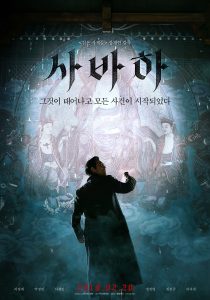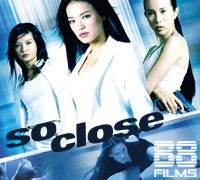Director: Jang Jae-Hyon
Cast: Lee Jung-Jae, Park Jung-Min, Lee Jae-In, David Lee, Jung Jin-Young, Hwang Jung-Min, Jin Seon-Kyu Ji Seung-Hyun, Yoo Ji-Tae, Moon Sook, Ok Joo-Ri
Running Time: 122 min.
By Paul Bramhall
I’m not sure if there’s something in the air, but the South Korean film industry has been cranking out a steady stream of evil ass-kicking Christians in recent years. From Kim Yoon-seok and Kang Dong-won in 2015’s The Priests, to Ahn Sung-ki and Parks Seo-joon in 2019’s The Divine Fury, and now Lee Jung-jae and David Park can join the ranks thanks to their roles in Svaha: The Sixth Finger. If we keep going at this rate, soon there’ll be enough characters for a Korean Christian themed version of Avengers.
Leading the charge is Jang Jae-hyeon, who returns to the director’s chair with his sophomore feature Svaha: The Sixth Finger. Jae-hyeon’s debut was The Priests, and in the 4 years that have passed since, he wrote the script for the Im Dae-woong directed House of the Disappeared. That movie, perhaps unsurprisingly, featured a priest attempting to get to the bottom of a murder mystery that takes place in a haunted house. For his second time both directing and handling writing duties, Jae-hyeon looks to combine the more traditional priests from his debut, with the mystery angle that he introduced in his most recent script.
For a guy who was able to cast Kim Yoon-seok in his debut, Jae-hyeon proves that his stellar casting choices were no fluke the 2nd time around, enlisting Lee Jung-jae as his lead. This is the first time for Jung-jae to headline a movie since 2017’s under-seen Warriors of the Dawn, having only appeared on the big screen in the intervening years as a special appearance in Kim Yong-hwa’s Along With the Gods franchise (The Two Worlds and The Last 49 Days). Here he plays a pastor who can best be described as a cross between Mulder from The X-Files and Philip Marlowe. Running a kind of private detective agency for religious groups, Jung-jae and his apprentice (played by David Lee of Swing Kids) investigate religious organisations that are fronts for either cults, pyramid schemes, or various other types of scam.
His latest focus is a newly formed Buddhist group that worships the Four Heavenly Kings (for those wondering, yes, the same Four Heavenly Kings from the latest entry in the Detective Dee series). It turns out Jung-jae doesn’t only limit himself to investigating Christian groups. Or at least that’s what I assume, actually we don’t see him investigating any for the duration. He is close with the local Buddhist monks though, and comes armed with a seemingly encyclopaedic knowledge of Buddhist practices, which are enough to make him suspicious of this latest groups intentions. All we know as an audience, is that they’re somehow connected to a teenage girl that we meet in the opening, played by Lee Jae-in (I Can Speak). Jae-in has a demonic twin who everyone believed would die shortly after her birth, but 18 years on and the twin is still alive, locked in a solitary room behind the kennels of the dog farm that she lives on.
The opening sets up a suitably foreboding sense of horror, both thanks to some in utero cannibalism and a grizzly birth scene, however as Svaha: The Sixth Finger settles into its narrative it becomes clear its more interested in being a noir styled mystery than it is a straight-up horror flick. The biggest frustration that we encounter as the viewer, is around the opaqueness of exactly what that mystery is. Considering the narrative starts with the horrific premise of a demonic sibling that’s been locked up and neglected for the past 18 years, there’s a disproportionately small amount of time spent on this particular element of the plot. Instead, most of the runtime is dedicated to Jung-jae’s investigations into a mysterious monk who allegedly achieved enlightenment, and may be responsible for reincarnating the Four Heavenly Kings in the present day.
Jae-hyeon throws a lot of elements together in his latest, to the degree that the mix of Christian and Buddhist practices is the least confusing aspect of everything that’s been thrown into the blender. We also get shamanism, sacrificial suicides, a lot of talk about reincarnation, ghostly visions, and at one point there’s a literal elephant in the room. Reflecting on my thoughts around The Priests, the same weaknesses are on show in Svaha: The Sixth Finger, the main one being the ideas that Jae-hyeon had in his head have struggled to come across as fully formed once committed to the screen. The most glaring example of this, is that Jung-jae and Jae-in (who plays both twins) never actually meet, which somehow feels like an obvious oversight. One is the main character, and the other at the center of the events he’s investigating, so as an audience we expect them to connect at some point, but it never happens.
Perhaps Jae-hyeon thought the presence of Yoo Ji-tae would be enough to mitigate the lack of such a meeting. Ji-tae is one of the most recognizable faces from many of the early Korean Wave classics, thanks to roles in the likes of Attack the Gas Station!, Old Boy, and Into the Mirror, and this is the first time for him to share the screen with Lee Jung-jae. For fans of Korean cinema like myself, I admit it was kind of cool to see two veterans of Korean cinema sharing screen time together, and Ji-tae plays a pivotal role in the plot which I wasn’t expecting. They even get to share a scene with that elephant I mentioned earlier (yes, there really is an elephant in the movie. No Tony Jaa though).
While I confess to enjoying the sight of Jung-jae running around in his trench coat like a 2019 Korean version of Humphrey Bogart, it’s impossible to deny that the characterisation across the board is weak. Supporting characters especially are given short thrift, from David Park playing Jung-jae’s assistant, to Jung Jin-young (Gangnam Blues) as the police chief investigating the same case. In fact the police force as a whole are made to look pretty incompetent as proceedings progress. From being introduced as a full-on task force when we first meet them in an encounter with Jung-jae, which I hoped would lead to them working together (it didn’t), they barely show up again unless some police information is required to propel the plot forward.
Despite this, there’s enough deep voiced chanting and slick visuals to keep Svaha: The Sixth Finger in the realms of being a pleasant distraction. The narrative is cluttered, and Jae-hyeon takes too long to begin tying the different threads together for the audience to be invested in what’s going on, however it’s definitely never dull. This is most likely because the ideas being presented feel original and fresh, meaning that at no point does it feel like we’re watching an inferior version of another horror flick.
If anything, the vibe that Svaha: The Sixth Finger most calls to mind is that of The Wailing. There aren’t many supernatural tinged Korean productions since the success of Na Hong-jin’s 2016 masterpiece that don’t draw this comparison, with everything from thrillers like Seven Years of Night, to straight-up horrors such as The Mimic, bearing its influence in some way. However while in most instances the comparisons tend to relate to the visuals and cinematography (never have I seen shamanism so prominently displayed in Korean cinema since The Wailing was released!), in Svaha: The Sixth Finger Jae-hyeon draws more on the themes and scenarios to incorporate into his tale. While the influence is there, to his credit it doesn’t feel derogatory, and I actually enjoyed the way it used a similar reveal thanks to how it was effectively executed.
If Svaha: The Sixth Finger didn’t provide you with your required evil ass-kicking Christian fix, then fear not, at the time of writing Bae Sung-woo is next up to put on a dog collar and go head to head with a demon in director Kim Hong-seon’s Metamorphosis. They keep on coming! For all of its failings though, I admit to finding Jae-hyeon’s sophomore feature an enjoyable watch. This year we’ve had a dose of God powered MMA (The Divine Fury), so why not a film noir influenced mystery that can only be solved with some divine intervention as well? A few too many inexplicable moments in the plot, and a focus which is sometimes out of tune with where it should be, stop Svaha: The Sixth Finger from being a strong recommendation. But as a supernatural mystery flick with sprinkles of horror scattered on top, the attempt at an original premise is an admirable one, the finished product just needs a bit more polish.
Paul Bramhall’s Rating: 6/10





A supernatural film noir? That’s up my alley! It’s too bad Svaha doesn’t hit the mark. I hope others try their take on the concept. (I can only imagine what that elephant is for. What the hell?)
The good news is it’s readily available on Netflix, so the answers you seek are just a few clicks away. 🙂
Availability of movie? Where the movie was available? Can you please tell me that because i want to watch this movie and thank you for sharing this movie.
It’s on Netflix (U.S.).
Svaha: The Sixth Finger is a 2019 South Korean mystery thriller film directed by Jang Jae-hyun